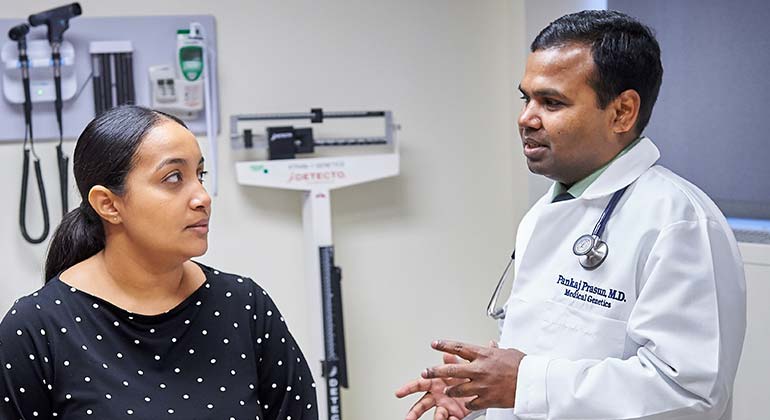Clinical Genetic Disorders Program

Genetic disorders are diverse and rare. At the Clinical Genetic Disorders Program, we specialize in the care of children and adults with known or suspected genetic conditions.
Our team consists of physician geneticists and genetic counselors. We work with other medical specialists – cardiologists, plastic surgeons, ear, nose, and throat specialists, speech pathologists, etc. – through special programs such as the Cardiovascular Genetics Program and the Craniofacial Disorders Program. We also work closely with specialized programs in our own department, including the Program for Inherited Metabolic Diseases and the Lysosomal Storage Diseases Program.
A Genetics Evaluation is a specialized evaluation targeted at making the diagnosis of a genetic condition. The evaluation consists of a detailed medical and family history, review of medical records and previous tests, and a physical examination.
At the end of the evaluation, tests may be recommended. Examples of such tests are chromosome analysis or DNA mutation analysis. These are generally performed on a small blood sample. New genomic tests are now available to identify changes in the genetic material that may be the cause of a disorder or syndrome. The ability to make a diagnosis has improved markedly.
The benefits of obtaining a specific genetic diagnosis include: better medical management, avoiding any future unnecessary tests and expenses, genetic counseling for future pregnancies and access to support groups and resources.
Who should be seen for a genetics evaluation: Symptoms of genetic conditions or syndromes can include early hypotonia, developmental delays, growth problems, an unusual appearance or birth defects.
Reasons for referral include:
- Congenital anomalies: congenital heart defects, hand, foot and limb anomalies, kidney anomalies
- Craniofacial disorders: cleft lip/palate, craniosynostosis (a condition in which one or more of the fibrous sutures in an infant skull prematurely fuses), unusual facial appearance
- Developmental disabilities: Global developmental delay, intellectual disability, autism spectrum disorders, fragile X syndrome
- Neurogenetics: Neurofibromatosis, Rett syndrome, hereditary ataxias, movement disorders
- Other known or suspected genetic disorders or syndromes , including hearing loss, visual problems, growth or skin disorders
Insurance Information
We accept most major commercial insurance plans. Testing will be coordinated, as far as possible, through insurance plans.